rex gordon and the old solar system
The contribution of "Rex Gordon" (Stanley Bennett Hough) to Old Solar System literature is a mighty one. Yet it consists of a single novel. That novel is No Man Friday - published in the US as First on Mars - and it is one of the four great 'singletons' in the literature on Mars.
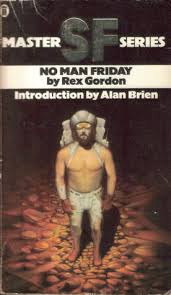
Stid: A sweeping statement. You mean, No Man Friday is up there with Out of the Silent Planet, Red Planet and The Sands of Mars.
Zendexor: I do exactly mean that, and like the other three masterpieces in the group, it has its own "speciality", offering something all its own.
(Which goes to show how vast Mars is, as an over-arching theme.)
Out of the Silent Planet is the one in which Earthmen can breathe the air of Mars - though only in the artificial valleys and lowland depressions. It's also the one which gives us not one but three quite separate species of intelligent Martians.
The Sands of Mars is about the wonder of ordinary, day to day, by-and-large-successful life during one man's voyage to, and life in, a Mars colony.
Red Planet is the one which juxtaposes a sizeable human colony with an advanced race of Martians.
And No Man Friday is the loneliest of the four books. No colony, just one human castaway.
It gives us - at first sight anyway - the bleakest Mars. And a seemingly impossible challenge for Holder, the crash-landed Briton who was never meant to be "first on Mars". Harlei, you say something - you're jumping up and down.
Harlei: I want to say that it's three books in one! The first part - say the first six chapters - is a choice morsel of the Old Space Program. In vivid and loving detail we're given a shoestring mission, planned by dedicated enthusiasts in the desert outback around Woomera.
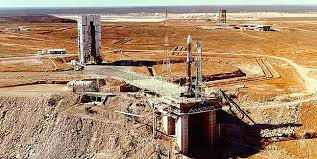
I used to get letters from my mother if from no one else. She asked me what we found to talk about, in a place that was as empty and desolate as I described. I said we had plenty to talk about and listed exhaust velocities, fuels, the metallurgy of firing chambers, trajectories, and displacements caused by turn-overs at high altitudes. There were plenty more items, but they were more technical and I did not think she would understand them.
I wasn't a fool. I hadn't been there six weeks before I realized that you either made your life around those things, along with the bearded university professors, the mathematicians in grimy shorts, the chemists with sun hats on their bald heads, and the physicists whose hair seemed to grow mostly on their chests, or you went out with the screamers. You could tell the screamer cases even before they began to paint their funny pictures or write away for correspondence courses on how to play the oboe. They would walk around with a shattered expression on their faces and, when you said something interesting about the new peroxide-nitric-acid comparison formula, they would back away as though they had seen something creeping up behind you. They never lasted. There was only one thing that kept men sane at Woomera, and that was rockets.
The Government, as things are, would never support a Mars mission, so, the scientists and engineers at Woomera, who are convinced that they can do it, aim to force the issue by means of a success which will make those in power sit up and notice. But that means concealment of the hardware:
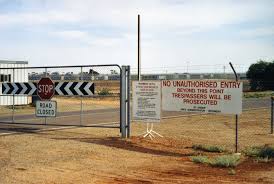
...the only way anyone could think of protecting it from the prying eyes of visiting politicians, treasury officials, and our own more stupid Security guards was first to initiate a water project, sink an artesian well, build a water-tower, abandon the well because it produced no water, then hide the project in the tower. How would you have hidden a rocket standing two hundred feet high and with a diameter of fifty-six feet around the base?
It made us furious sometimes. All the best brains of sixteen Empire universities going to waste because no one could think of a way of explaining why we needed three hundred-ton liquid oxygen tanks for rockets whose maximum all-up weight was supposed to be in the neighbourhood of thirty tons...
..."When I think," Maxwell said, standing inside the water-tower and looking up at the towering rocket that almost filled it. "When I think that if we could only have cooked the books to the tune of another three million pounds we could have made a landing, it almost makes me weep."
But as things stood, they did not dare "go for a landing". The mission plan was for a circumnavigation of Mars. Then, bringing back their photographs (remember, this is the Old Space Program - no telemetry, no digital stuff) they'd get the acclaim and the support they needed...
Only, it didn't turn out that way. A disaster on board - a faulty hatch during a spacewalk by one of the crew - and one of the men, the narrator, Holden, the only one in a "diving suit" (no bespoke space-suits in those days!) is the one man left alive on the rocket speeding towards Mars.
Holden is no mathematician and can't possibly calculate the return orbit. (No computers, no ground control in those days.) So what does he do? Crazily, or rather wisely, he decides upon his one-in-a-billion chance -
It was true that Mars had no breathable atmosphere, no potable water, and no sign of any source of food. So what?
You might say that I had been born with a spanner in one hand and a blueprint in the other.
I was going in to land.
Zendexor: You said, Harlei, that No Man Friday is like three books in one. I take it that Aspect Number Two is the central theme: what happens when Holden is down on Mars, alone, in a crashed ship. His plight thrills the reader: this is it, the crunch, the seemingly impossible challenge of survival.
I suppose it's what people go to Ridley Scott's The Martian to see: how can a lone human face that challenge.
Of course, its magnitude depends on what kind of Mars he's on.
Harlei: The reader is briefed quite clearly on that point during the approach, when Holden muses upon the current state of knowledge as the red ball of Mars grows in the viewport:
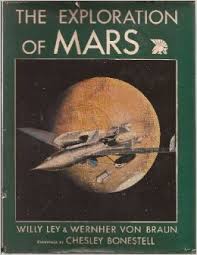 1950s Mars
1950s MarsMars. A planet about half the size of Earth. A year that was about twice as long as on Earth, a day that was about the same. Atmospheric pressure one hundred millibars. Oxygen constituent not one hundredth. Temperatures ranging between those of Siberia and those of a London spring. Life presumed to consist of primitive lichens and bacteria. Arid. Windless. Thin ice in the polar caps that melted in the summer.
Or as you and I would put it: No air, no food.
He doesn't even know how to land the rocketship properly. But he at least has the privilege of the Old Space Program, of looking with fresh eyes, un-jaded by countless images from space probes.
There was terror in my soul as I lay on my couch, in my straps, looking down on that red planet which seemed to swell until it ate up the heavens. What I was doing was suicide, but it was suicide on the grand scale. During all the previous history of our world men had risen from it, climbed and flown, but... never had they landed anywhere else.
What the reader gets from a book like this is a real sense of a Mars that is indeed somewhere else.
I could see two snowy polar caps, one large, one small. I could see an edge of flatness to the disc where night lay across all the other side. I could see great bands and areas of vivid colour. This was a world, an actual world. I had seen photographs of Mars - who on Earth has not? - but those hazy miniatures, hardly impressing one with their detail nor even conveying the reality of their subject, were nothing to what I saw now. I could not, it is true, pick out, to any great extent, more detail. Certainly I could see neither cities nor evidences of life, nor even mountain ranges, evident for what they were, such as are visible in any photograph of the moon. This was a flat planet, without seas or great outstanding features, but it was its reality that was impressive, its overwhelming existence as a solid world.
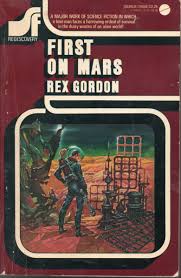
He gets down - with a crash that wrecks most of the rocket. He survives for fifteen years - but how? Not by any cheating on the part of the author. This is straight stuff: Holden survives by ingenuity together with a believable amount of luck, and we go through it all with him, with no skimping on the method. We're with his thoughts and feelings and actions as gets through the crucial first few days by his sheer skill and inventiveness. He solves the problems of water and air - but that leaves the bigger problem of food.
That's the real killer - lack of food. In the long term the cards are stacked against him. So how does he survive, for so many years, until the next expedition?
Stid: Another parallel with the Ridley Scott film.
Harlei: Except that Holden remains out of touch with Earth. He has no means of communication with Earth. And no one on Earth knows about him; the flight had been kept secret, and those at Woomera who were in the know must have assumed, when the ship did not return, that the entire crew had perished. When another ship does reach Mars, an American ship, fifteen years later, its crew are amazed to find him. Amazed because they knew of no British expedition; amazed at his survival; and doubtless amazed because he was at the right spot to meet them when they landed. Mars is a big place after all. No, they just can't believe their eyes when they see Holden...
Stid: It's getting a bit much for my credulity too. Are you going to get on to the book's third aspect, and will you manage to stop it from snapping the thread of the main theme?
Harlei: Time for me to hand over to Zendexor. I'm too scared of spoiling the story.
Zendexor: I know just what you mean, and the danger is considerable. Let's get back to the title: No Man Friday, which clearly suggests that we're in for a "Robinsonnade" in which the modern-day Crusoe does not find anybody, does not see any "footprint" on his "island".
And yet, eventually, it happens. Not in the same way of course. Here, the "footprint" is first of all the sight of a tough leathery Martian fruit that has been bitten in two, and then, a bit later, in a particularly spellbinding passage, a moving narrow-beamed light in the blackness of night, accompanied by tremors through the ground as "of the elephantine movement of some great beast". A time of terror and awe and wildly mixed evidence - suggesting at last to Holden that Mars could not be understood in earthly categories of "life" or "intelligence".
I slid through the airlock and took refuge in the sweet Earth-sanity of the interior of the rocket with much the same feelings a dog must have when he finds safety behind his master's gate. I was too tired to eat, but I drank two pints of fresh, clear water and lay down on my improvised couch in the control compartment. I expected to fall asleep immediately and to awake in the morning with a clearer conception of what had happened.
Instead I lay awake, with the light on, and looked about me at the metal walls of the wrecked ship that was my home. In those moments when my overtired, fevered brain lay battling with the unknowns of Mars, I had a clearer conception of myself and of my position on the planet than any I had had since I landed.
The steel shell which covered me, which provided me with shelter and air and water - that was not Mars. I had only to turn my head and see couches, instruments, pipes and electric leads which had been made on Earth. So far, that was what I had worked with. All my puny striving on this planet had not been a conquest of Mars but only improvisation, with Earth equipment, to fit me for a strange environment.
Mars was stranger, greater, and more unknown than I had imagined that it could be.
I had been a fool... What now of my belief that Martian creatures must necessarily be unintelligent and slow-moving, that with so little oxygen in the air to breathe, they would only be able to sustain their body temperatures in the heat of day, and that brains could not develop without the fuel and air and precise temperature control which animals and birds achieved on Earth? I had thought those things.
But now I was not so sure...
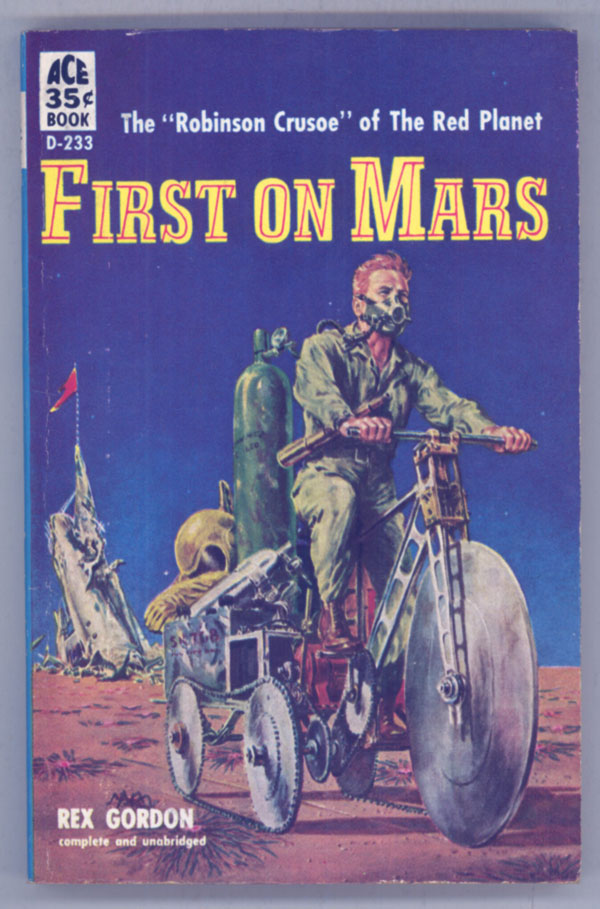
On a southward seasonal migration, which hunger forces him to undertake, Holden eventually discovers that the true lords of Mars are beings who do not breathe at all. Evolution on Mars has taken a step beyond its course on Earth. I won't say any more about that, except to remark that a wider topic than physical survival surrounds the practical core of the book, just as a vast velvet cushion may contrast with, and set off to perfection, the diamond that scintillates at its centre.
Stid: You mean, the "diamond" is the book's core, that's to say what Harlei calls Aspect Two, which is Holden's initial struggle to survive on Mars. And the velvet cushion around it - well, that's the philosophical realization concerning the ultimate achievement, which we will have to reach when we have mastered our environment. The challenge of, "What next?" And awareness of this ultimate challenge, which will involve "Why" rather than "How", is your Aspect Three, isn't it, Harlei?
Harlei: I didn't want to be the one who says so. Rex Gordon's book, great though it is, is vulnerable to one criticism: some readers may opine that Holden the mechanic would never say or think the big things he realizes by the end of the story. In other words, that his final perceptions are out of character.
Zendexor: Bunk. Anyone isolated on Mars for fifteen years and learning the lessons he learns, would have to grow the way he grows. Especially after encountering the real Martians... Let's leave it there. Leave it with Holden and his one remaining light-bulb, flashing in a desperate attempt to communicate with the almost unimagineable life-forms that cannot be compared with any earthly class of creature... leave him to triumph and at the same time to realize that in a wider sense he is beaten. Read this wonderful book.
Rex Gordon, No Man Friday (1956; published in the USA as First on Mars); Ridley Scott (Director), The Martian (2015 movie)
For more on Holder's arrival on Mars, and a comparison between his planetfall and that of Carson Napier on Amtor, see the OSS Diary for 22nd December 2016.
For Holder's reflections on the possible ubiquity of biota see Life anywhere.
Extract: Meeting a mighty Martian.
>> Authors





























